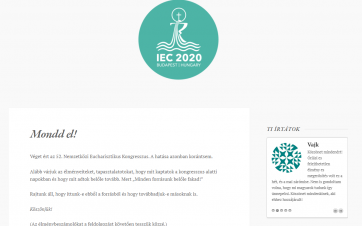
János Székely: The greatest treasure of all is Jesus’ glad tidings

Both the priest and the bishop should be personable enough, so to be able to deliver God’s human-centred interest love.
Becoming an apostle – that is the most important duty of all those who are operating in the gypsy pastoral care – confesses the Bishop. The priest’s and the Bishop’s human-centred attitude is of extreme importance, since this is the way they are able to convey God’s human love accordingly - said the Bishop of the Szombathely Diocese. The Bishop is very much convinced that the right approach to the gypsy evangelization is not equal to that of sitting in the Parish and waiting for them to enter.
János Székely was born in 1964 in Budapest, into a deeply religious family with many children. He carried out his higher education studies in Esztergom, in Budapest and in Bethlehem, thereafter continued his studies in Rome at the Pontifical Biblical Institute. In 1991 he was ordained a deacon in Jerusalem and the very same year was ordained a priest as well. In 2017 the Holy Father appointed him as Bishop of the Szombathely Diocese.
He started his service in Érsekvadkert, where he was deeply touched by both the poverty of the marginalised gypsies and by the many potentials they had. “My gypsy brothers outpoured me with their enormous amount of love. There were few places where I had the very same good feeling like I had with them” – wrote János Székely about this period of his life in the introduction of his book, the “Get around the Gypsy world”. From this moment on he was seeking for opportunities elsewhere as well, to find the way for transmitting the greatest treasure of all: Jesus’ glad tidings. He is strongly convinced that we all were born to learn how to love. To love each of us, particularly the ills, the elderlies, the weak and the poor.
“Both the Church and the believers are sluggish, they both have difficulties in opening up to the gypsies. There is a huge chasm between the gypsies and the non gypsies, still we hardly do anything or we just remain too slow in our steps to build a bridge, in spite of the fact that the non gypsies can more easily overstep such a chasm than the gypsies. Priests, catechists, believers are all in a much better position. Priests are respected and always welcomed by gypsy families, all these people are open to prayers, to blessing. The door is definitely open” – voiced the Bishop in an interview given to the Új Ember newspaper. It has been again highlighted by him that the right approach to the gypsy evangelization never means of sitting in the Parish and waiting for them to enter. The mainstream society is attached to the churches for centuries long, while this has never been part of the gypsy tradition.
“We have to create that very face of the Church which is attractive to the gypsy society. At this point we are in the very last moment, we still have the chance to change the situation. Should we act otherwise, our mutual country will be torn apart.” – warned us the Bishop.
Last August almost a hundred lay persons and clergy personalities attended the Gypsy Pastoral Retreat in Szombathely, organised for the first time. During the opening Holy Mass János Székely, the leader of the Gypsy Pastoral Committee to the Hungarian Catholic Bishops’ Conference underlined: “the principal duty of the gypsy pastoral staff is to become an apostle.” The necessity and the success of the retreat was clearly apparent upon the announcement of the participant Bishops’: a 2nd National Gypsy Pastoral Retreat is going to be held in Máriapócs between 2-9 August 2020.
The leader of the Saint Martin Diocese considers more than relevant that the Bishops should be always available: “The shepherd should have a lamb odour. That is to say: the shepherd should well know the life and problems of his herd. The shepherd has to take the lead, showing the way, then has to live inside the herd, listening to his people. Finally he has to be present at the end of the herd as well, so that to give a helping hand to the last ones, to the sufferings” – as he cited Pope Francis’ thought in his interview given to Mandiner. János Székely does his best to remain available as much as possible, while feels important the human attitude of the priest and of the bishop, thereby ensuring the transmission of God’s humankind.
János Székely is going to present the achievements of the gypsy pastoral in the course of a workshop at the Hungexpo.










